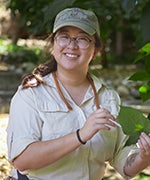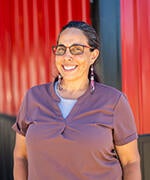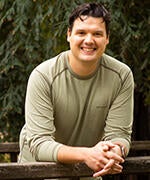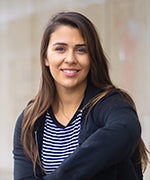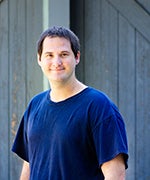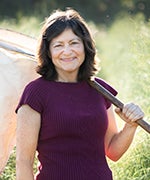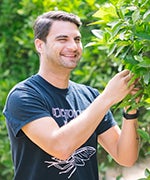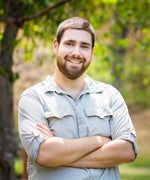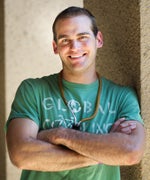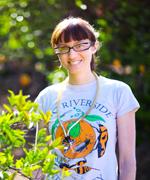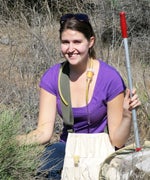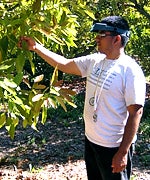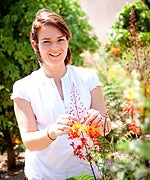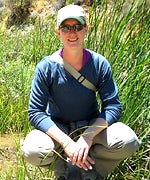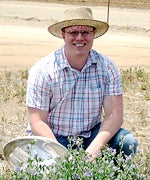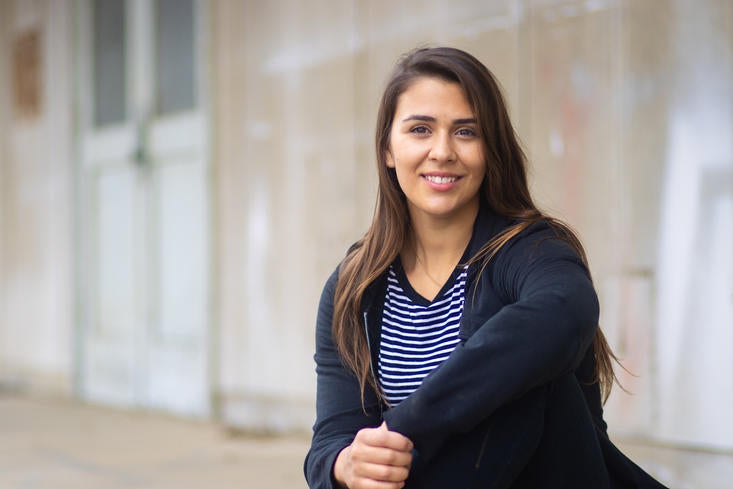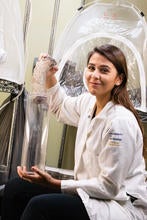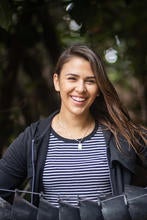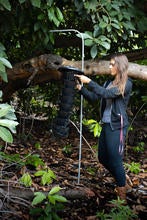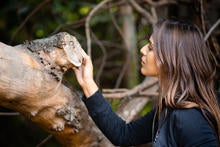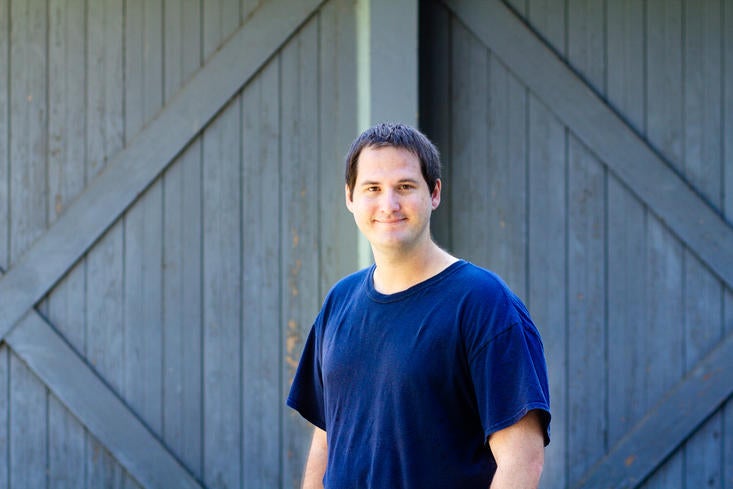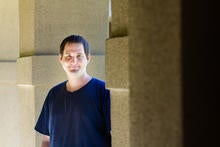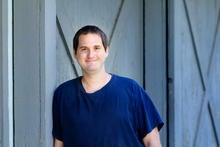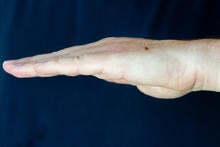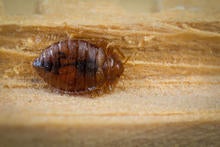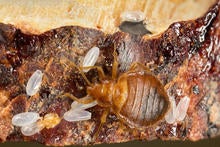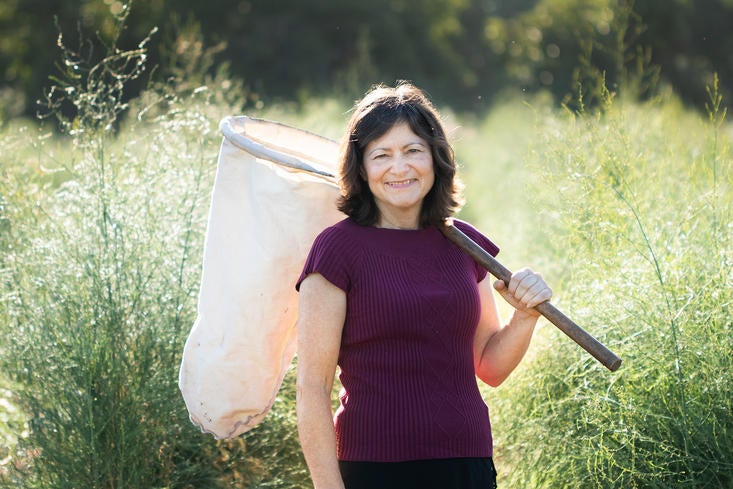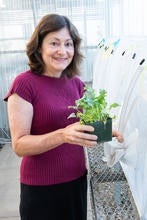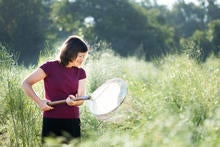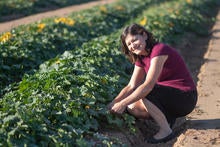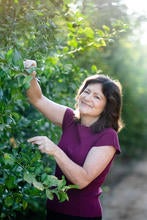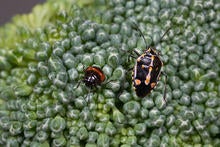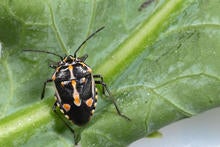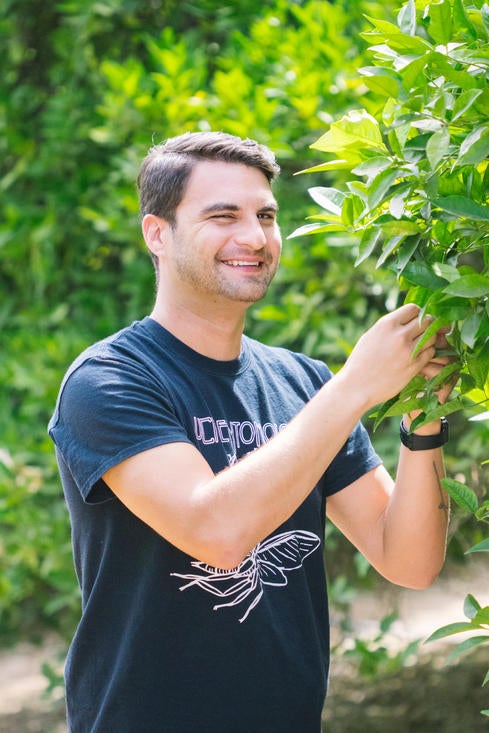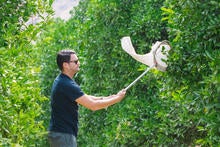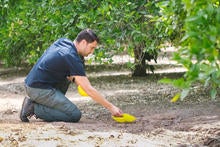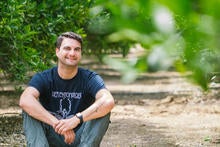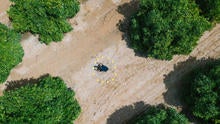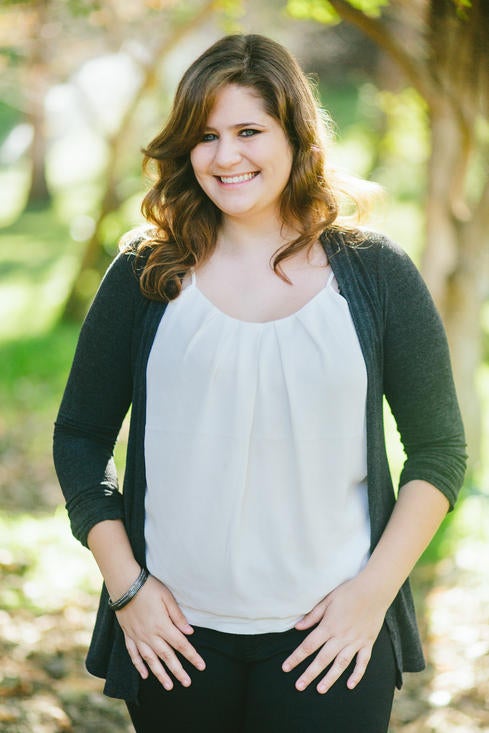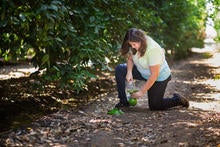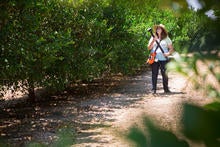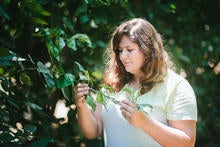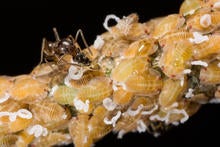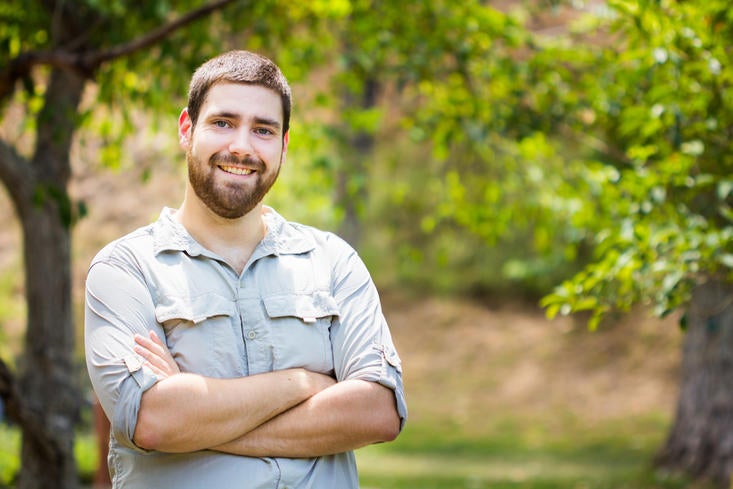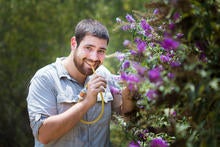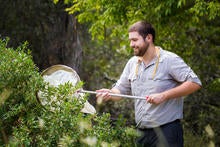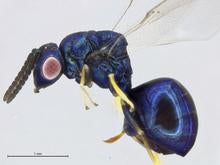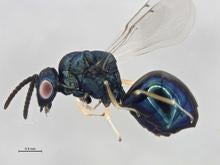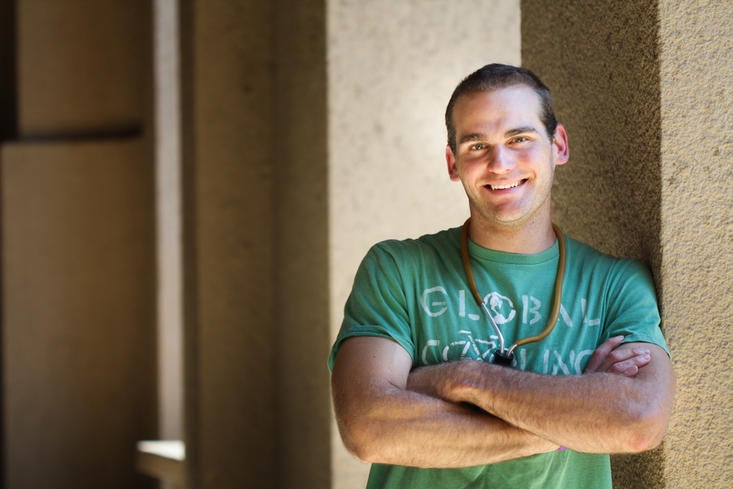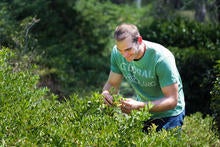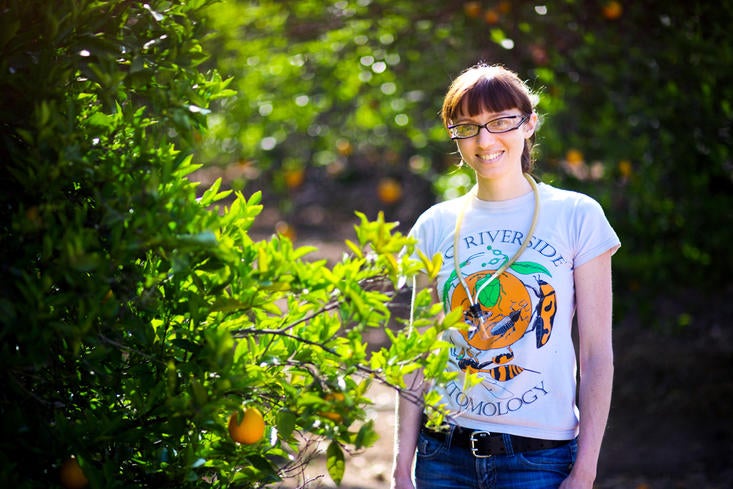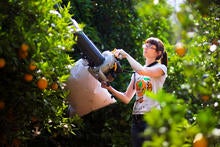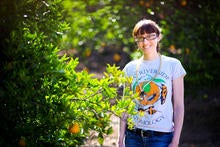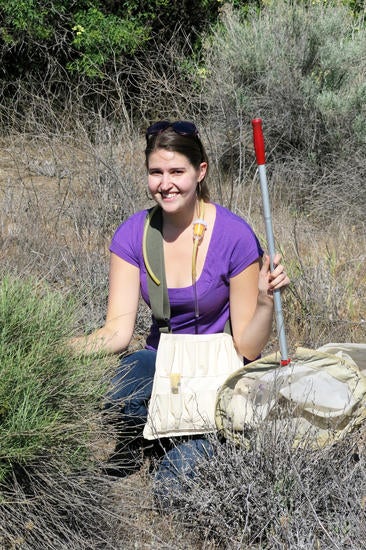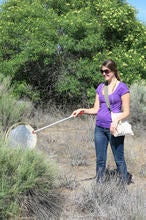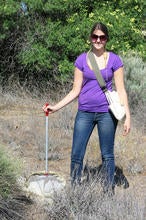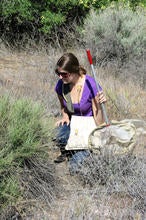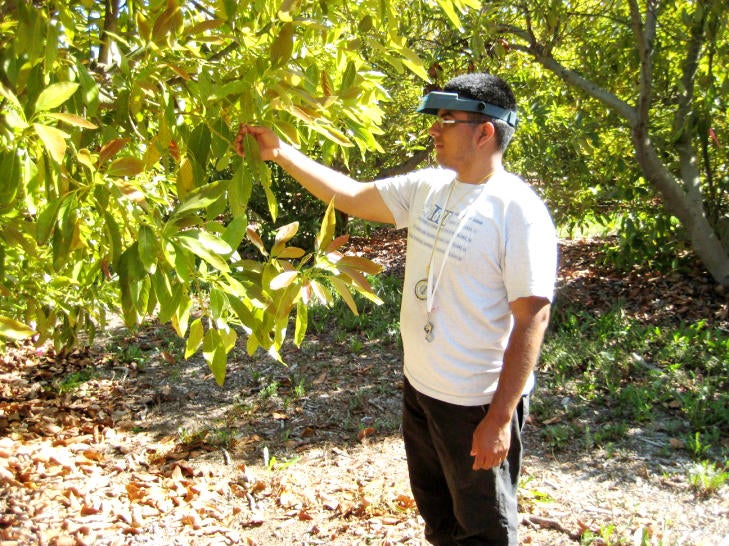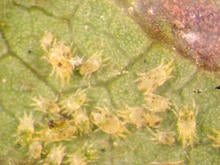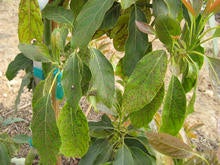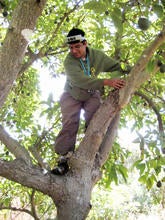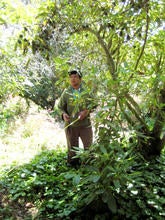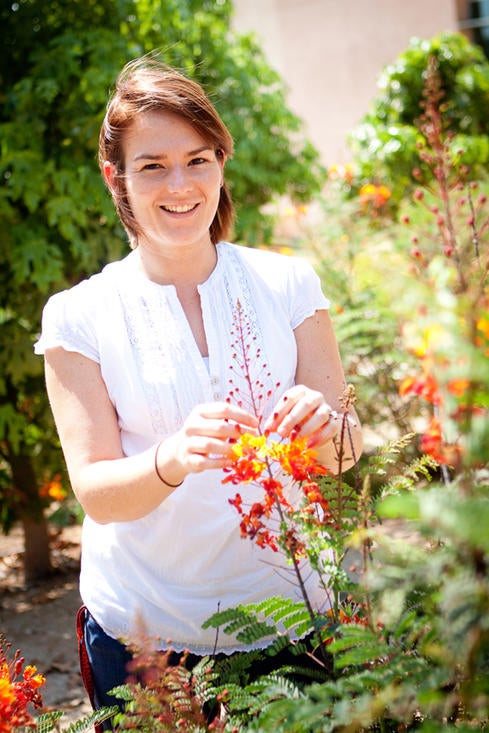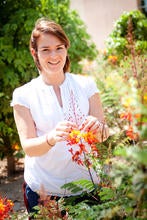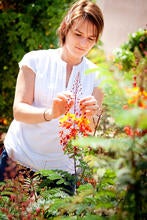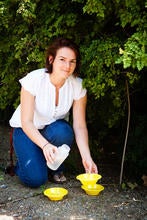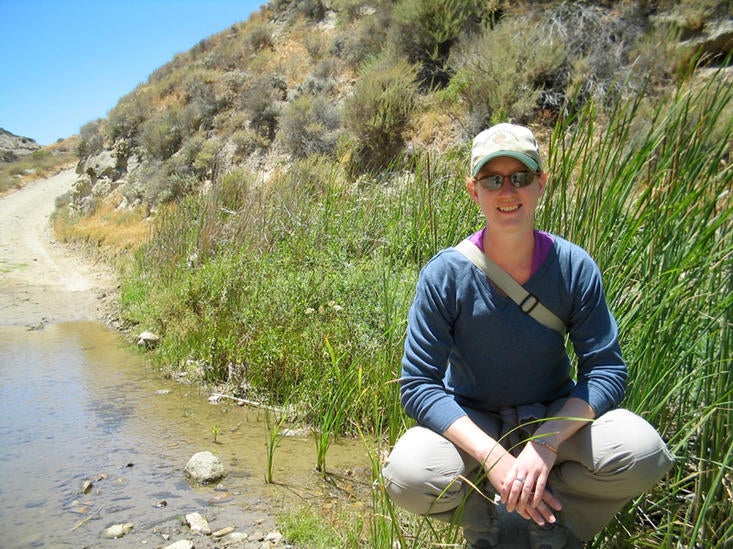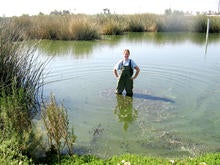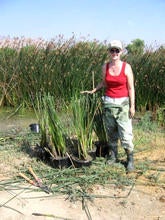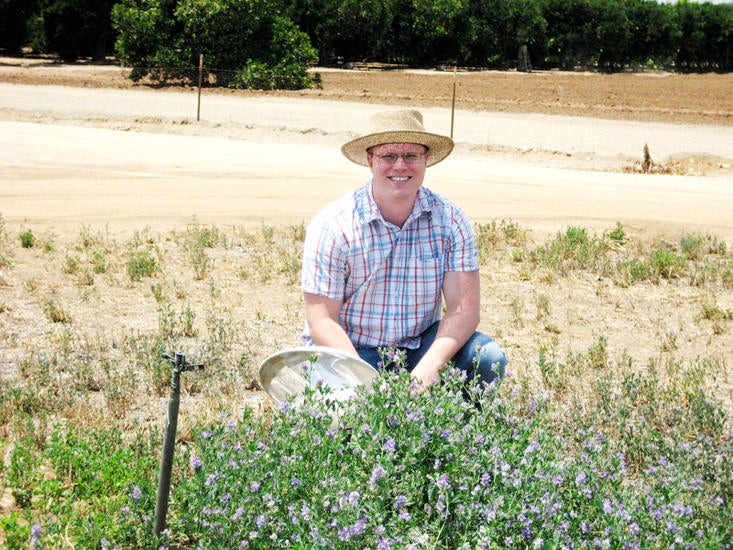Deena Husein
2020 Scholarship Recipient
Deena Husein is a fifth year Ph.D. candidate in the Entomology Department at the University of California, Riverside. Deena’s first interaction with agricultural pests started in her junior year of high school by participating in the Young Scholars Program- a summer internship funded by the University of Georgia for high school students interested in agroscience. Her project involved collecting glassy-winged sharpshooters and determining the distribution of the plant pathogen they vector, Xylella fastidiosa, in Georgia. In 2013, Deena graduated from the University of Georgia with a B.S.A. in Biological Science and a B.S.E.S. in Entomology. She later applied for an internship abroad at Kyushu University in Japan to study the effects high levels of CO2 had on the development and fecundity of the adzuki bean beetle.
Deena’s research at UCR focuses on finding natural enemies of the polyphagous shot hole borer beetle, Euwallacea fornicatus, (PSHB). The PSHB is an invasive pest that can easily attack over 400 different plant species including, but not limited to, California sycamore, maple, castor bean, and avocado trees. Research shows that allowing this beetle to roam free will accrue a substantial amount of money (over $15.9 billion) to remove and replace infested and susceptible trees.
Conventional methods of control, such as topical and systemic insecticides along with mating disruption, are ineffective due to the cryptic lifestyle of the beetle, which deemed finding natural enemies of the pest to be a high priority. The end goal is to determine, rear, and release successful biological control agents in the hopes of reducing the PSHB population in southern California.
The Harry S. Smith award will enable Deena to collect more colonized logs from the native region of the PSHB. This will provide additional resources to help identify potential biological control agents and assess their likelihood of implementing them in a successful program by conducting host specificity assays. This award will also provide the opportunity for Deena to travel to Taiwan and attend the Bark and Ambrosia Beetle Academy where she will learn from experts in her field on how to properly identify scolytine beetles, better understand their ecology, and determine the best route to control them.
Deena's scholarship is made possible in part by these 2020 donations
A special thanks to Stuart Swanson, Susan Deardorff, Claudia Giardina, John and Janet Kabashima, John Orr and Pamela Marrone.
Mark Dery
2019 Scholarship Recipient
Mark Dery is a fourth year Ph.D. candidate in the Entomology Department at the University of California, Riverside. After completion of an Associate degree at Riverside City College in 2013, he transferred to California State University, San Bernardino, where he conducted research on mosquito insecticide resistance in the laboratory of Dr. James Ferrari. During this project, Mark developed an interest in entomology while observing mosquitoes when rearing the colonies. After the completion of a B.S. in Biology, he began the Entomology Ph.D. program at the University of California, Riverside in 2016.
Mark’s research at UCR focuses on bed bugs (Cimex lectularius), blood feeding, parasitic insects that are infamous for infesting the mattresses of their primary host, humans. Bed bugs are among the most difficult urban pest to control. Widespread insecticide resistance and their cryptic nature make bed bugs particularly hard to control. While not known to transmit diseases, bed bugs significantly affect human well-being, by causing itchy welts when they feed which can cause severe psychological distress to those affected.
Existing methods for controlling bed bugs often fail to provide effective, yet safe and inexpensive control. As a result, a new biological control method has been developed for bed bug control, the application of an insect killing fungus (Beauveria bassiana) to infested areas. Specifically, Mark’s work investigates possible chemical or behavioral defensive mechanisms that bed bugs may utilize to inhibit or avoid the fungus and how to overcome these defenses.
The Harry S. Smith Biological Control Award will allow Mark to focus on his research and present this work at the Entomological Society of America Annual Meeting in St. Louis, Missouri in November 2019.
Mark's scholarship is made possible in part by these 2019 donations
A special thanks to George Markin, Susan Deardorff, Retha Keenan, Pamela and John Pavela, Dan and Carolyn Cahn, Roger and Patricia Essick, Paul and Kathryn Madonna, Gayle and Rick Marrocco, Dr. Kouichi and Mrs. Grace Tanaka, Phil and Robin Tognazzini, Chuck and Cathi Wrench and Robert and Sue Cooley.
Nancy Power
2018 Scholarship Recipient
The Harry S. Smith Scholarship Award will enable Nancy to focus on this biological control research and to present her research findings at the Entomological Society of America/Entomological Society of Canada joint meeting in Vancouver in November, 2018.
Upon finishing her Ph.D., she would like to do another stint overseas, this time as a Fulbright scholar or through the federal RIFA program. After that, she plans to return to California to work with specialty crop growers through industry or the U.C. Cooperative Extension to develop and promote integrated pest management and biological control.
Building on a B.A. degree in Biology from the University of Virginia, Nancy Power earned a Master of Science degree in Agricultural Science with an emphasis on sustainable agriculture at Cal Poly Pomona. While at Cal Poly, her interest was piqued by a class on biological control, for which she had to find and collect 30 parasitoid species. The professor, Dr. Lester Young, noted that the U.C. Riverside Entomology Department was famous for its excellent research on biological control.
After Cal Poly, Nancy worked for a local non-governmental organization in the Philippines for a year, assisting small-holding rice farmers to grow rice more sustainably and profitably, to diversify into other crops to complement the rice, and to use the scientific method to test the success of innovations.
Upon returning to California, Nancy taught high school environmental science and biology for several years, including collaborating with her fellow science teachers to create a school vegetable garden. She had her students design and execute experiments in the garden, based on real life problems such as how to control ground squirrels.
Thrilled with the opportunity to return to school herself, she returned to the idea planted by Dr. Young of studying biological control at UCR. Here she is investigating Ooencyrtus sp., a tiny (< 1mm) wasp from Pakistan that is a parasitoid of the eggs of bagrada bug, a species of stink bug (Pentatomidae). Also called painted bug, Bagrada hilaris first appeared in the U.S. in L.A. County in 2008. It quickly became a major pest on broccoli and related crops, and spread to other counties and states. To evaluate the wasp’s potential as a biocontrol agent of bagrada bug, Nancy is exploring the Ooencyrtus species’ host specificity by testing its ability to reproduce on the eggs of alternate hosts. She is also investigating the lifetime fecundity and longevity of the wasps, to see if it can multiply faster than bagrada bug. Furthermore, to determine optimal mass rearing conditions, she compared the growth rate of immatures at several different temperatures, and tested the effect of different ages of the parasitoid and the host eggs on reproductive success. Her final experiment will be to consider how the wasps find host eggs on plants and in soil, where the bugs lay them.
The Harry S. Smith Scholarship Award will enable Nancy to focus on this biological control research and to present her research findings at the Entomological Society of America/Entomological Society of Canada joint meeting in Vancouver in November, 2018.
Upon finishing her Ph.D., she would like to do another stint overseas, this time as a Fulbright scholar or through the federal RIFA program. After that, she plans to return to California to work with specialty crop growers through industry or the U.C. Cooperative Extension to develop and promote integrated pest management and biological control.
Nancy's scholarship is made possible in part by these 2018 donations
A special thanks to Dr. George Markin, CAPCA San Diego, Paul and Kathryn Madonna, Susan Lyon, Nora Hackett, Retha Keenan, Cynthia and Allen King at King and King Ranch, John Orr, Richard Kitzman, Cristina Leon and Emma Ruiz, Charles and Claudia Giadina, Salvador Dominguez at Total Labor Force Inc, California Rare Fruit Growers at the Foothill Chapter, Dr. Kouichi and Mrs. Grace Tanaka, Bob and Sue Cooley and Anonymous.
Ryan Perry
2017 Scholarship Recipient
Ryan Perry is a fifth year Ph.D. candidate in the Entomology Department at the University of California, Riverside. He graduated from the California Polytechnic State University, San Luis Obispo with a B.S. in Environmental Horticulture Science. His interest in insects was solidified while enrolled in a Biological Control course at Cal Poly, rearing parasitized insects in an effort to identify the emerging natural enemies. He continued at Cal Poly for his Masters work in Plant Protection Science, under the guidance of UCR Entomology alumni, Dr. David Headrick, successfully using artificial pheromones to disrupt Citrus Leaf Miner mating, in an effort to reduce CLM populations to economically stable levels without the use of pesticides. He completed a year of work at the California Academy of Sciences on Dr. Brian Fishers AntWeb imaging project, which included five months at the Museum of Natural History in London, in an effort to photograph every known species of ant.
Ryan’s prior research on leafminers drove his interest to conduct research on the parasitic wasps of these insects. He has focused on a complex tribe, of insect parasitoids, Cirrospilini, which belongs to the family Eulophidae (Hymenoptera: Chalcidoidea), one of the most important families of conservation and classical biological control. The wasps that Ryan has been working with have the potential to be used in biological control programs in the state, and throughout the world, and collecting and sequencing their DNA are the first steps in understanding any potentially beneficial organism. His molecular and morphological revision aims to help solve the problems associated with color and morphological variation within a tribe of economically important parasitic wasps. In analyses utilizing morphological, molecular, and geographical data, species and generic boundaries are being examined and tested. This will improve knowledge of biodiversity by systematically revising a tribe in much need of taxonomic work, with results that can be applied to other similarly problematic groups in the future. This study will provide the largest molecular phylogeny and host database focused on the most species-rich family of Chalcidoidea, allowing the relationships between species and hosts to be evaluated, aiding biological control and conservation efforts considerably.
The Harry Scott Smith Award is a tremendous asset for his studies, which will provide funding for undergraduate support and training, sequencing costs of DNA, and travel to present his research. Results from current research will be presented this year at the Entomological Society of America’s annual meeting in Denver, Colorado.
Ryan's scholarship is made possible in part by these 2017 donations
A special thanks to Merla Gaut, Steven and Robin Smith at Mud Creek Ranch, Dwight Tate, Peter R. and Shane L. Butler at Butler Family Growers LLC., Patrick Lloyd--Butler with James Lloyd-Butler Family LLC., James Lloyd-Butler with James Lloyd-Butler Family LLC., Rachel Levin, Gary and Kathy Veeh, Jim Pardee at Pardee Farms, Leslie Leavens with Leavens Ranches LLC., Robert and Carl Hardison, Nora Hackett, Wayne and Carol Elder at Durling Nursery, Ellen Brokaw at Brokaw Ranch Company, David Holden at Holden Research and Counseling, Tom Delfino and Cynthia Dong, Retha Keenan, Jim Finch at Finch Family Foundation, Susan and Don Deardorff, John Orr at Orr del Norte, Timothy Kelley, Patrick Mahoney at West Coast Arborist Inc., Fred and Suzanne Legner, Kirke and Venita Jorgensen, Jennifer Merchant, Richard Pidduck at Santa Paula Creek Ranch, Kouichi and Grace Tanaka, Robert and Martha Orth, Gary Caviglia at Crystal Cove Farms, John and Janet Kabashima, Paul Lofthouse at Lofthouse Ranch, Rick and Gayle Marrocco at Fallbrook AgLab, Nora Hacket, Pamela and John Pavela, Albert Stehly at Stehly Grove Management Inc., George McEwen at NcEwen Nursery, Lynn LeBeck and Marshall Johnson, Phil Tognazzini at Tognazzini Avocado Partnership, Devon and Claire Carroll, Carl Stucky, Sinthya Penn, Roger and Patricia Essick, Daniel and Carolyn Cahn, William Gardner, Carol Englehardt, Peter and Patricia Miller, Brenda and Robert Powers, David Wahlquist, Harold Doshier, and Patrick and Norma Yarbrough.
Kelsey Schall
2016 Scholarship Recipient
Kelsey Schall is a third year Ph.D. candidate in the Entomology Department at the University of California, Riverside. In 2009 she graduated from the University of California, Santa Barbara as a Regent’s Scholar with a B.A. in Biology from the College of Creative Studies. Her interest in insects started with a high-school entomology course and matured throughout her undergraduate studies. As a student researcher at UCSB she became fascinated by parasitic interactions, first studying them in marine life, and later through an independent insect biodiversity survey at the Carpinteria Salt Marsh Reserve. Her strong interest in parasitology and entomology made biocontrol a natural fit for a graduate-level program.
Following acceptance into the Entomology Ph.D. program at the University of California, Riverside in 2013, Kelsey began her research on biocontrol of ant-tended honeydew-producing insects infesting California’s iconic citrus crop. The most significant of these pests, the Asian citrus psyllid, Diaphorina citri, in combination with its vectored disease, huanglongbing (caused by the CLas bacterium) poses an unprecedented threat to the state’s $3-billion-a-year citrus industry. Substantial psyllid population reduction is necessary to curtail disease spread through commercial production areas. As part of a comprehensive approach aimed at long-term integrated pest management of D. citri in California, Kelsey’s research investigates the efficacy of ant control strategies for augmenting D. citri biocontrol. These strategies focus on suppression of the Argentine ant, Linepithema humile, the most ubiquitous and problematic tramp ant found in Southern California citrus.
In upcoming work she will test a novel, low-toxicity and biodegradable baiting system for L. humile in citrus. Baits and application methodologies derived from this research could be expanded to other valuable crops that suffer greatly from ant-tended pests (i.e., wine grapes and tree nuts), considerably improving biological control across California and upholding its historical precedent of strongly successful IPM programs.
Kelsey will utilize funds from the Harry Scott Smith Biological Control Scholarship to purchase ant bait stations and a field vehicle to travel to her experimental citrus groves stationed across Southern California. The award will additionally support her travel to an international academic meeting (International Congress of Entomology, Orlando 2016) as well as several industry meetings hosted by organizations such as the Professional Association of Pesticide Applicators, UC Master Gardeners, and the Citrus Research Board’s ACP BioControl Taskforce. These opportunities will allow her to continue to extend her critical, practical research findings to both members of the academic community and end-users –California’s pesticide applicators and growers.
Kelsey's scholarship is made possible in part by these 2016 donations
A special thanks to Robert and Carol Hardison, Ed Clarke and Jane Delahoyde, Mera Gaut, Dr. Marshall Johnson and Dr. Lynn LeBeck, California Avocado Commission, Jim Finch, Carol and Wayne Elder, Durling Nursery, Ed Traynor, CAPCA San Diego, Glenn Rees at Rees Agricultural Services Inc., Gary Veeh, Leavens Family Ranches, Jim Pardee, Dwight Tate, Carol and Logan Hardison, Dr. Betsy Boyd and Dr. Justin Nay, Scott Van Der Kar at Pinehill Ranch, Mr. John Grether at Grether Farming Company Inc., Rachel Levin, Dr. Nora Hackett, Barton and Merla Gaut, Steve and Robin Smith at Mud Creek Ranch, James Llyod Butler at Lloyd Butler Ranch, Peter Butler at Famly Growers LLC, Patrick Butler at PL-B Ranch, Reetha Keenan, Dorcas Thille at J.K. Thille Ranches, John and Pamela Pavela, Tim Spann, Joe Barcinas at FAR Inc., John Orr at Oro del Norte LLC., California Organic Gardening Club, Jim Davis at American Insectaries Inc., Colleen Klapproth, Oscar and Minda Suguitan, James Mickey, Leffingwell at Ag. Sales Company, Lindsay California, Ruth Wilson, Allen and Cynthia King at King and King Ranch, Richard Pidduck at Santa Paula Creek Ranch, George McEwen at McEwen Nursery, Dr. Fred and Mrs. Suzanne Legner, Marjie Bartels at Bartels Ranch, Warren Nishimura at Nishimura Farms, California Avocado Development Organization, Dr. Richard Goeden and Mrs Joan Goeden, Nora Hackett, Joe Barcinas F.A.R. Inc., Kouichi and Grace Tanaka, Limoneira Ranch, Robert and Marth Orth, Roger and Patricia Essick, Dr. John and Mrs. Janet Kabashima, Sinthya Penn at Beneficial Insectary, Dan and Carolyn Cahn, William (Bill) Hahlbohm at Sundance Natural Foods Co, William Carleton at Las Palmitas Ranch, Devin and Claire Carroll, James McMurty, Scott Van Der Kar, Susan and Donald Deardorff, Carl Stucky, Phil and Robin Tognazzini, Glenna Horton, Carolyn Louise, Villines, Leffingwell Ag. Sales Co, Lindsay California and Lorraine Forster.
Austin Baker
2016 Scholarship Recipient
Austin Baker graduated from Oregon State University (OSU) with a B.S. in Zoology. He first gained an interest in insects while studying abroad at James Cook University in Cairns, Australia, where he made his first insect collection. Upon returning to OSU, he began his work in beetle systematics with Dr. David Maddison. He started his Ph.D. at the University of California, Riverside in 2013. The focus of his research has been revising the genus Orasema (Hymenoptera: Eucharitidae), a group of parasitoids that specialize on ants. The groups of ants that are targeted by these wasps include some of the most invasive genera: Pheidole (big headed ants), Solenopsis (fire ants), and Wasmannia (electric ants).
Orasema is a diverse genus, and distinguishing one species from another can be very difficult. Austin has spent the last few years trying to organize these species using a variety of approaches, including molecular sequencing, morphological studies, and behavioral observations. Next-generation DNA sequencing has enabled the use of massive quantities of genetic information to better understand evolutionary relationships. Austin will be applying these new techniques to investigate and delimit the species of Orasema. Gaining a good understanding of the taxonomy and host preferences of this group is a necessary first step before assessing their potential for biological control of invasive ant species. Austin is developing a pipeline of procedures to increase the efficiency of species discovery and delimitation that will be applicable across the superfamily Chalcidoidea.
Austin will present the current results of his research at the International Congress of Entomology in Orlando and attend a bioinformatics workshop at Florida State University with the funding provided by the Harry Scott Smith Biological Control Scholarship. This will allow him to learn from other’s research and learn the techniques that will be essential for processing massive quantities of genetic sequencing data.
Austin's scholarship is made possible in part by these 2016 donations
A special thanks to Robert and Carol Hardison, Ed Clarke and Jane Delahoyde, Mera Gaut, Dr. Marshall Johnson and Dr. Lynn LeBeck, California Avocado Commission, Jim Finch, Carol and Wayne Elder, Durling Nursery, Ed Traynor, CAPCA San Diego, Glenn Rees at Rees Agricultural Services Inc., Gary Veeh, Leavens Family Ranches, Jim Pardee, Dwight Tate, Carol and Logan Hardison, Dr. Betsy Boyd and Dr. Justin Nay, Scott Van Der Kar at Pinehill Ranch, Mr. John Grether at Grether Farming Company Inc., Rachel Levin, Dr. Nora Hackett, Barton and Merla Gaut, Steve and Robin Smith at Mud Creek Ranch, James Llyod Butler at Lloyd Butler Ranch, Peter Butler at Famly Growers LLC, Patrick Butler at PL-B Ranch, Reetha Keenan, Dorcas Thille at J.K. Thille Ranches, John and Pamela Pavela, Tim Spann, Joe Barcinas at FAR Inc., John Orr at Oro del Norte LLC., California Organic Gardening Club, Jim Davis at American Insectaries Inc., Colleen Klapproth, Oscar and Minda Suguitan, James Mickey, Leffingwell at Ag. Sales Company, Lindsay California, Ruth Wilson, Allen and Cynthia King at King and King Ranch, Richard Pidduck at Santa Paula Creek Ranch, George McEwen at McEwen Nursery, Dr. Fred and Mrs. Suzanne Legner, Marjie Bartels at Bartels Ranch, Warren Nishimura at Nishimura Farms, California Avocado Development Organization, Dr. Richard Goeden and Mrs Joan Goeden, Nora Hackett, Joe Barcinas F.A.R. Inc., Kouichi and Grace Tanaka, Limoneira Ranch, Robert and Marth Orth, Roger and Patricia Essick, Dr. John and Mrs. Janet Kabashima, Sinthya Penn at Beneficial Insectary, Dan and Carolyn Cahn, William (Bill) Hahlbohm at Sundance Natural Foods Co, William Carleton at Las Palmitas Ranch, Devin and Claire Carroll, James McMurty, Scott Van Der Kar, Susan and Donald Deardorff, Carl Stucky, Phil and Robin Tognazzini, Glenna Horton, Carolyn Louise, Villines, Leffingwell Ag. Sales Co, Lindsay California and Lorraine Forster.
Chris Shogren
2015 Scholarship Recipient
Chris Shogren graduated from the California Polytechnic State University, San Luis Obispo with a B.S. in Horticulture and a B.S. in Agribusiness. After finishing his undergraduate degree he worked for the San Luis Obispo County Agriculture Department as a pest detection trapper, where he assisted with monitoring for invasive insect species. Chris's background in the nursery industry and interest in the impact of natural enemies brought him to Riverside to obtain his Ph.D. in entomology at the University of California, Riverside.
In California, the nursery and floriculture industry is one of the top five commodities exceeding $3.5 billion in value. However, exotic insect species cost the industry millions of dollars annually in control measures and production losses. Chris studies the impact of natural enemies on invasive thrips populations on ornamental crops.
Chris's current research focuses on the identification and impact of natural enemies on the invasive myoporum thrips, Klambothrips myopori. This invasive thrips has killed an estimated 50% of Myoporum spp. plants in California since its introduction in 2005. The thrips has also spread to Hawaii where it is killing native Myoporum which provides a unique habitat and diet component for the endangered Palila bird (Loxioides bailleui). Current field studies have identified possible key natural enemies of myoporum thrips in southern California. Laboratory and field studies will be conducted with natural enemies identified from field surveys to evaluate their efficacy and potential for augmentative biological control of myoporum thrips.
The Harry S. Smith Biological Control Award will allow Chris to focus on his research and to present a portion this work at the upcoming Entomological Society of America Pacific Branch annual meeting to be held in Hawaii in April 2016.
Aviva Goldmann
2013 Scholarship Recipient
Aviva Goldmann is a 3rd year PhD candidate studying biological control of Asian citrus psyllid (ACP) in California. ACP is a serious threat to California citrus because it can vector a bacterium which causes a disease in citrus trees. To help optimize classical biocontrol of ACP, she will characterize, collect, and identify the sex pheromone of Tamarixia radiata, a parasitoid of ACP, and use it to develop a simple monitoring tool for population-level field experiments. To advance augmentative and/or conservation biocontrol of ACP, Aviva will describe the native arthropod natural enemy community, determine relative numbers of ACP consumed by natural enemies by DNA-based gut analysis, and produce a ranking of the candidate predators for conservation biological control and/or mass rearing.
Aviva developed a vocational interest in insect biology during her undergraduate studies at U.C. Berkeley. Entomology combined with a long-standing interest in agroecology made biological control a natural fit. Before beginning graduate studies, Aviva worked as a technician at in Dr. Nick Mills’ lab at U.C. Berkeley for three years, where she worked on biological control of agricultural pests, including walnut aphid, mealy plum aphid, spider mites, and light brown apple moth.
Aviva will use the funds provided by this award to attend and present her work at the 2013 Entomological Society of America national meeting and the 2014 ESA Pacific Branch annual meeting. After completing her PhD, she plans to work with specialty fruit and nut growers through UC Extension, industry, and/or private consulting to improve and promote biological control and integrative pest management in California.
After completing her PhD, she plans to work with specialty fruit and nut growers through UC Extension, industry, and/or private consulting to improve and promote biological control and integrative pest management in California.
Judith Herreid
2013 Scholarship Recipient
Judith Herreid graduated from the University of Wyoming with a B.S. in Zoology and a B.A. in Spanish. This is where she first became interested in Entomology and parasitoid wasps. Now as a first year Ph. D. student she is working with a genus of eucharitid wasps. Orasema are parasitoids of ants and have a fascinating life cycle that involves gaining access to their host with specialized behaviors. Species of Orasema are potential biological control agents because of their role as parasitoids of ants in the genera Solenopsis (fires ants) and Wasmannia. Both genera include economically important invasive species. A greater understanding of Orasema taxonomy and diversity would foster their biological control possibilities.
Currently Judith is writing a revision of seven species in the Orasema simulatrix species group. These are parasitoids of Pheidole in the southwestern United States. This species group exhibits interesting behaviors that include being closely associated with extra floral nectaries of Desert-willow. Her revision will include morphological, biological and ecological information on the Orasema simulatrix species group. Much of the biological and ecological information will be collected through field work at the Southwestern Research Station (Portal, AZ) in the summer of 2013. After this revision is completed Judith will expand her research to other species groups in the genus Orasema and develop a hypothesis for the evolution of various mechanisms of ant association.
The funds from the Harry Scott Smith Biological Control Scholarship will allow Judith to attend a specialized training course in ant taxonomy and ecology. The Ants of the Southwest course, which is taking place this summer at the Southwestern Research Station, will broaden her knowledge of ants and greatly help her research. Having a strong understanding of ant biology, ecology, behavior and identification will be invaluable to her future research.
Jesus R. Lara Artiga
2011 Scholarship Recipient
My research objectives within the field of biological control include a fundamental understanding of the conservation, biology, and ecology of natural enemies associated with economically injurious organisms, in particular, phytophagous mites. As part of meeting this goal I am using the California avocado system to explore the biology and ecology of beneficial predatory mites (Acari: Phytoseiidae, Stigmaeidae) to enhance our understanding of their ability to control the foliar feeding mite, Oligonychus perseae Tuttle, Abatiello and Baker (Acari: Tetranychidae), from Mexico. In addition to California, O. perseae has invaded several commercial avocado growing areas throughout the world, including Israel, Spain, and Costa Rica. My long term career goal is to apply the knowledge I acquire during my graduate experience at UC Riverside to conduct research on biological control to be used in the development of sustainable pest control programs in agricultural systems.
To continue fostering my professional formation in entomology and acarology, I will use the funds ($1,000) of the Harry Scott Smith Scholarship Award to cover the registration fees for a two-week taxonomic workshop at Ohio State University in July 2011 that will focus on identifying groups of mites associated with arthropods, in particular insects such as bees, ants and beetles. Taxonomy is an essential component of developing effective biological control programs given the need to correctly identify pest species and associated natural enemies that can potentially be deployed for suppression of target pest populations. As part of my current research, I will use my training from the mite workshop to identify species of predatory mites (Acari: Stigmaeidae) that have not been recorded from surveys in the California avocado system and new areas of Mexico and whose conservation in avocado orchards may be useful for reducing populations of phytophagous mites.
Holly Hills
2011 Scholarship Recipient
I am a second-year Ph. D. student, working with a tiny egg parasitoid in the genus Trichogramma. These parasitoids attack the eggs of many insects, and are especially useful in controlling caterpillar pests in field and greenhouse crops. Before introduction in to the field, Trichogramma species are commonly mass-reared in insectaries. I am investigating the impact of mass-rearing, which results in inbred populations, on the field fitness of these natural enemies, particularly T. pretiosum.
I am currently testing life-history traits in many lab-reared lines of T. pretiosum. Eventually, these lines will be mixed to introduce genetic diversity, mass-reared for varying periods of time and then released into the field. I will later re-collect these parasitoids from release areas after they have had a chance to reproduce, and determine how long their parents were mass-reared for by testing their DNA for a particular mitochondrial marker.
Based on the numbers of offspring I find surviving from populations that were mass-reared for short vs. long periods of time, I will be able to infer field fitness and determine whether long periods of mass-rearing are really the best strategy for producing natural enemies for augmentative and inundative biological control. Hopefully, this research will help us to improve rearing practices and also improve the quality of Trichogramma (and possibly other natural enemies too) being used for biological control.
I will be using the funds provided by the Harry Scott Smith Biological Control Scholarship fund to cover registration and travel expenses to the 2011 Entomological Society of America meeting that is being held November in Reno, Nevada.
Jennifer Henke
2008 Scholarship Recipient
Jennifer Henke has long been fascinated by aquatic communities. Growing up in northern Alabama, she spent much of her time outdoors, playing in the woods and fishing. She received her Bachelor’s degree in biology at the University of Alabama in 2001. After earning her Master’s in entomology at the University of Georgia in 2005, she moved to Riverside to obtain her Ph.D. in entomology at the University of California, Riverside.
In southern California, wetlands are created primarily for wastewater management and mitigation. While these water sources have had the added benefit of creating habitats for migrating waterfowl, they also provide suitable habitat for pestiferous insects such as biting midges and mosquitoes.
Jennifer studies environmental factors that affect wetland invertebrate food webs with an emphasis on how to use this knowledge to biologically-control mosquitoes. The Harry S. Smith Biological Control Award allowed her to present a portion of her research in a talk entitled “Better Control of Mosquitoes through the Use of Native Larvivorous Fish” at the Society of Wetland Scientists meeting in May 2008 located in Washington, D.C.
Jennifer’s research focused on the use of a native larvivorous fish, the arroyo chub, to replace the exotic and invasive mosquito fish which has historically been widely used for mosquito control. The arroyo chub is a species of special concern in California as it is restricted to 4 watersheds within the southern portion of the state. Use of this native fish not only has the advantage of controlling mosquitoes, but also provides a novel way to help preserve a rare native California species.
Upon completion of her Ph.D. at UC Riverside, Jennifer plans to be become a professor and continue her research, combining ecology, conservation biology, and biological control nuisance pests.
Casey Butler
2008 Scholarship Recipient
Casey Butler was raised in Walkerton, Indiana and graduated from Purdue University with B.S. and M.S. degrees in Entomology. His Ph.D. research project at the University of California at Riverside involves examining environmental problems associated with climate change and man-made pollution and how the combination of these two things can affect aspects of the biological control of insect pests.
In particular, Casey is studying how the main and interactive effects of temperature and the environmental pollutant selenium affects parasitoid fitness, competition for resources, and heat shock protein expression that can protect natural enemies from adverse environmental effects such as high temperatures.
As part of this research, Casey, is also interested in the effects of pollutants on top-down (i.e., the effects of natural enemies) and bottom-up (i.e., the effects of crop plants on the pests and ultimately the natural enemies attacking these pests) processes in combined interactions between the crop plant, the pest and the natural enemies attacking the pest.
The support gained from the Harry S. Smith Biological Control Award will be used by Casey to present a talk at the upcoming Annual Meeting of the Entomological Society of America in November 2008 at Reno in Nevada on the results of a study conducted on the parasitoid Cotesia marginiventris (Cresson). This is an important parasitic attacking a variety of pest caterpillar species including cutworms, earworms, army worms, and hornworms that infest crops such as alfalfa, beans, and tomatoes.
Casey’s future career goals are to obtain a Ph.D. in entomology from UC Riverside and to continue to work in the field of biological control.

